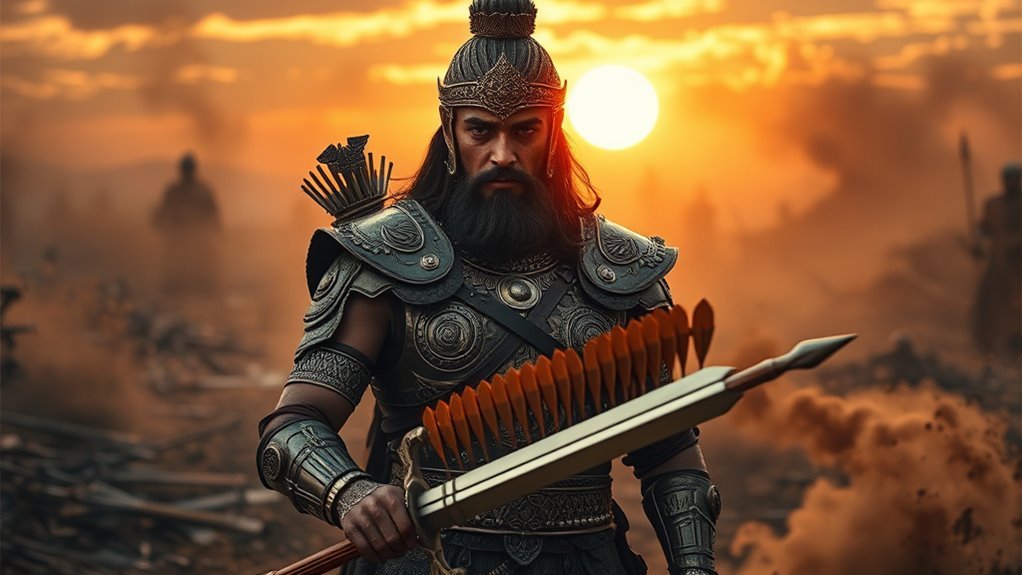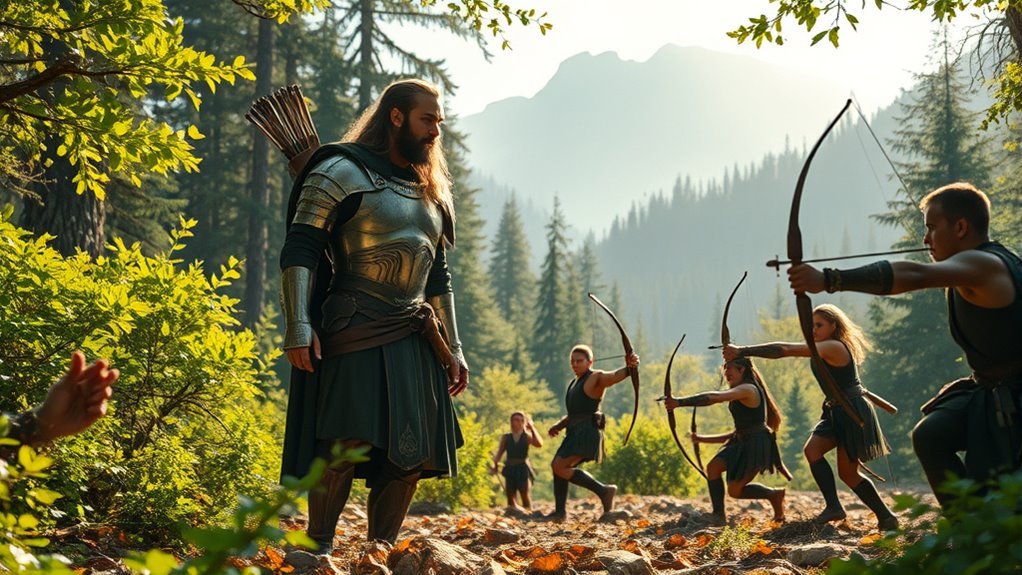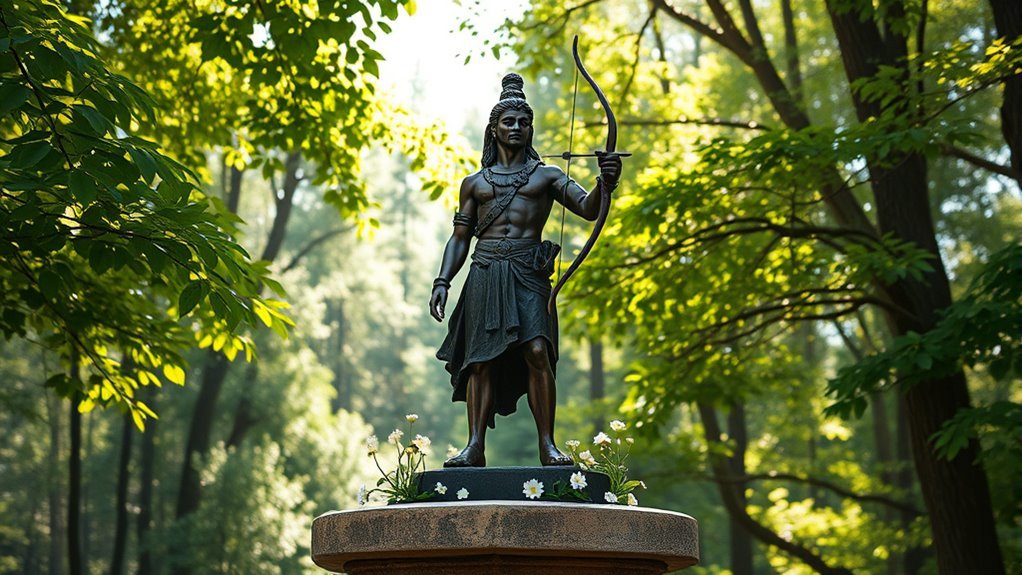Drona’s role in the Mahabharata is multifaceted and deeply complex. As the royal teacher to both the Pandavas and Kauravas, he fosters relationships built on loyalty and ambition. His bond with the Pandavas contrasts sharply with his favoritism towards Arjuna, creating tension among his students. As the war unfolds, Drona must navigate moral dilemmas that test his commitment to dharma. Understanding his influence on the epic’s events offers insight into the lasting impact of his teachings and choices.
Early Life and Training of Drona

Drona, one of the pivotal characters in the Mahabharata, had a formative early life that considerably shaped his destiny as a master teacher and warrior. Born into a Brahmin family, Drona’s ancestry endowed him with a rich cultural heritage, emphasizing knowledge and skill. His father, a sage, instilled in him the values of discipline and learning. Drona’s education was rigorous; he studied under revered teachers, absorbing the intricacies of martial arts and sacred texts. This foundation not only honed his combat skills but also fostered an understanding of dharma, the moral duty that guided his actions. These early experiences cultivated his ambition, allowing him to transcend his humble beginnings and become a pivotal figure in the epic, ultimately influencing the fate of the Kurukshetra War.
Drona’s Role as the Royal Teacher

As an essential figure in the royal court, Drona’s role as the royal teacher greatly impacted the education and training of the Kuru princes, including the Pandavas and Kauravas. His teaching methods blended rigorous discipline with innovative techniques, emphasizing practical skills alongside theoretical knowledge. Drona instilled a sense of duty and honor, shaping the warriors’ character as much as their combat abilities. His influence on warriors extended beyond mere instruction; he inspired loyalty and respect, creating a bond that transcended the classroom. Drona’s emphasis on individual strengths allowed each prince to excel in their own right, while also fostering a competitive spirit, essential for their future roles in the epic conflict of the Mahabharata.
Drona and the Pandavas: A Special Bond

As you explore Drona’s complex relationship with the Pandavas, you’ll notice how their early interactions set the stage for a profound bond. His role as their teacher not only shaped their martial skills but also established a deep loyalty that would later be tested by the unfolding events of the Mahabharata. This dynamic of mentorship intertwined with themes of loyalty and betrayal reveals the intricate layers of their connection.
Drona’s Early Relationship
While the circumstances of Drona’s life were often marked by conflict and loyalty, his early relationship with the Pandavas revealed a unique connection that transcended mere instructor-student dynamics. Drona’s childhood in a Brahmin family instilled in him values of knowledge and discipline, shaping his role as a teacher. When he first encountered the Pandavas, he saw not just students, but potential heirs to a legacy of warrior prowess. Their shared experiences and challenges fostered a bond of mutual respect. Drona’s family background and the struggles he faced as an outcast influenced his approach to mentorship, allowing him to connect deeply with the Pandavas, who themselves were navigating through their complex identities amidst the greater narrative of the Mahabharata.
Teaching the Pandavas
Drona’s role as a teacher to the Pandavas was not merely a duty; it was a profound engagement that shaped their destinies. His teaching methods, characterized by a blend of discipline and encouragement, fostered their skills in archery and warfare. Drona didn’t just impart knowledge; he instilled confidence, pushing each prince to realize their potential. His personalized approach allowed him to connect deeply with each Pandava, understanding their strengths and weaknesses. This connection facilitated a unique bond, creating a nurturing environment for growth. Drona’s impact on the Pandavas was transformative, molding them into formidable warriors. As they embraced his teachings, they not only learned techniques but also values that resonated throughout their lives, setting the stage for their future challenges.
Loyalty and Betrayal
Though loyalty often defines relationships, the bond between Drona and the Pandavas was intricately woven with complexities of trust and betrayal. You see, Drona’s loyalty to his students was profound, yet it conflicted with his duties to the Kauravas, particularly as war approached. This loyalty conflict manifests in Drona’s decisions, driven by a sense of obligation and honor. When Drona chose to fight for the Kauravas, the betrayal motives stemmed from a mix of personal and societal pressures, leaving the Pandavas feeling forsaken. They grappled with the dichotomy of their mentor’s allegiance, struggling to reconcile their admiration for him with the pain of perceived betrayal. This intricate dynamic reveals the nuanced nature of loyalty and the heart-wrenching consequences of divided loyalties.
Drona’s Complex Relationship With the Kauravas
As Drona navigated his role as both a teacher and a warrior, his relationship with the Kauravas became increasingly intricate and fraught with tension. The Kauravas’ upbringing, steeped in rivalry and ambition, created a dynamic where Drona’s favoritism towards Arjuna often alienated his other students. While he aimed to instill discipline and skill, his bias toward Arjuna fostered resentment among the Kauravas, particularly Duryodhana. This favoritism complicated Drona’s position, as he struggled to balance his loyalty to the Kauravas with his duty to a deserving student. Drona’s attempts to guide them in a morally ambiguous world ultimately led to a fractured bond, reflecting the challenges inherent in his dual role as mentor and warrior.
Moral Dilemmas and Choices in the War
In the epic of the Mahabharata, Drona faces profound moral dilemmas that pit his loyalty to the Kauravas against his duty as a teacher and warrior. You’ll notice how these ethical conflicts shape his decisions on the battlefield, often leaving him torn between personal bonds and the larger implications of war. As you explore Drona’s choices, consider how these moments reflect the complexities of loyalty and righteousness in times of conflict.
Drona’s Loyalty vs. Duty
While traversing the tumultuous landscape of the Kurukshetra War, Drona faces profound moral dilemmas that pit his loyalty to the Kauravas against his duty as a teacher and warrior. You can feel the weight of his loyalty conflicts and duty dilemmas as he grapples with choices that define his character.
- He must train warriors who’ll fight against his beloved students.
- Drona’s commitment to his craft is tested by the bloodshed around him.
- His allegiance to the Kauravas challenges his ethical stance as a mentor.
- He struggles with the implications of his decisions on both sides.
- Ultimately, his choices reflect the complexities of loyalty and duty.
In this war, Drona’s inner turmoil reveals the intricate balance between personal ties and professional honor.
Ethical Conflicts in Battle
Amidst the chaos of the battlefield, ethical conflicts emerge not just as personal struggles but as defining moments that shape the course of the war. You find yourself grappling with ethical dilemmas that challenge your sense of morality. Each choice carries weight—do you prioritize loyalty to your kin or uphold justice for the greater good? Drona, caught between his duty as a mentor and the brutal realities of battlefield morality, illustrates this struggle vividly. His decisions, steeped in honor yet fraught with consequence, reflect the broader struggle faced by all warriors. As you witness these moral quandaries, you realize that every action taken can either forge a path to liberation or deepen the cycle of conflict.
Legacy and Impact of Drona’s Actions
Drona’s actions in the Mahabharata resonate far beyond the battlefield, as they intricately shape the destinies of both the Pandavas and Kauravas. His influence extends into the moral and ethical domains, where his choices echo through generations. Drona’s legacy includes:
- Shaping the values of duty and loyalty among his students.
- Instilling a sense of rivalry that fuels the epic conflict.
- Highlighting the complexities of teacher-student relationships.
- Exposing the tragic consequences of unwavering loyalty to a flawed cause.
- Influencing the perception of dharma, especially in the face of personal ties.
Ultimately, Drona’s life serves as a powerful reminder of how our decisions can create ripples that affect not just ourselves but also those around us, shaping destinies for years to come.
Frequently Asked Questions
What Were Drona’s Views on Loyalty and Duty?
You’d find Drona’s views on loyalty and duty complex, often highlighting loyalty conflicts, especially when duty expectations clashed with personal ethics. His choices reflect deep inner struggles, revealing the weight of allegiance in moral dilemmas.
How Did Drona’s Actions Influence Future Generations?
Drona’s legacy shaped future generations by emphasizing the importance of loyalty and discipline. His teachings instilled a sense of duty, influencing warriors and leaders to navigate complex moral dilemmas while endeavoring for honor and righteousness.
Did Drona Have Any Significant Rivals?
You might think of Drona’s adversaries like Bhishma, whose complex relationships with Drona shaped their conflicts. This rivalry not only influenced their fates but also impacted the larger narrative of loyalty and duty in the epic.
What Were Drona’s Personal Beliefs and Philosophies?
Drona’s ethical dilemmas often reflected his belief in duty and loyalty. His teaching methods emphasized discipline and skill, but they sometimes conflicted with his personal values, revealing the complexities of his character and philosophical struggles.
How Is Drona Portrayed in Different Adaptations of the Mahabharata?
In various adaptations, Drona’s character reflects complexity; he’s seen as both a mentor and a tragic figure. His legacy intertwines honor and conflict, prompting you to explore how these depictions shape perceptions of loyalty and duty.

